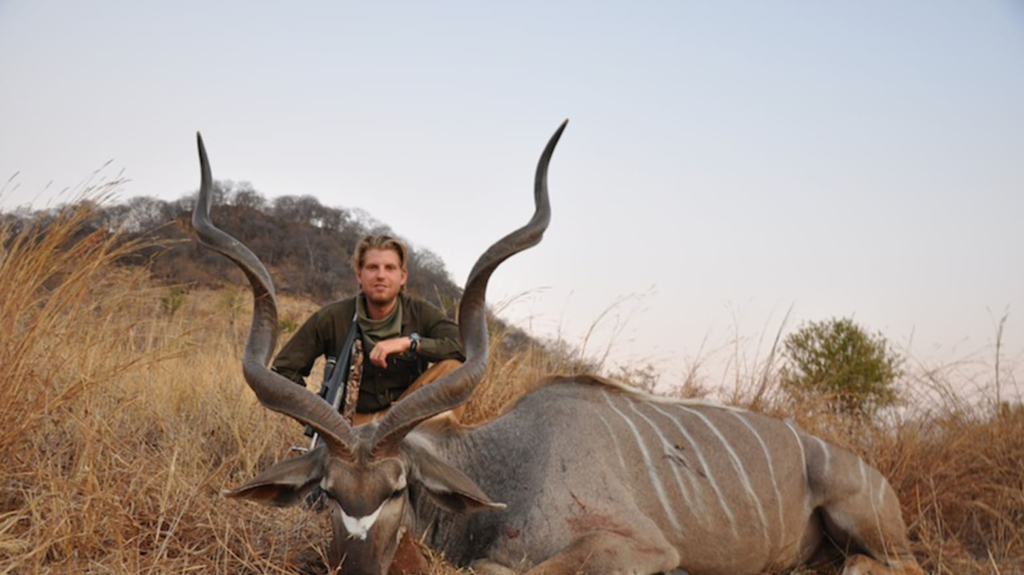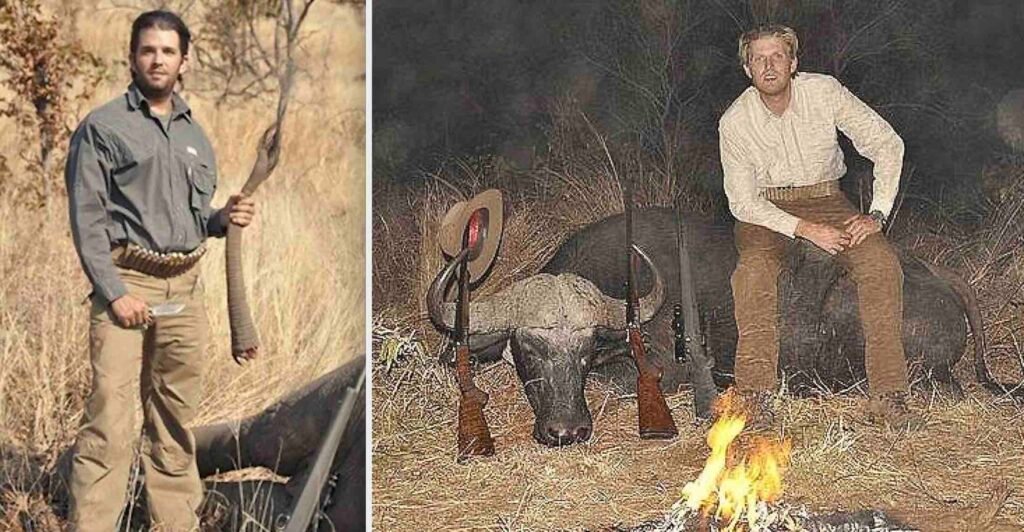Photographs from a controversial hunting expedition taken by Donald Trump Jr. and Eric Trump in Africa last year have recently resurfaced, igniting a fresh wave of debate over the ethics of trophy hunting. These images, posted by the hunting tour company on their website, show the Trump brothers posing with various dead animals, including an elephant, buffalo, crocodile, and a large leopard. The pictures have triggered outrage among conservationists and wildlife enthusiasts globally, highlighting ongoing tensions around trophy hunting practices.
The Hunting Trip and Its Fallout, among the images, one particularly striking photograph depicts Donald Trump Jr. grinning while holding the severed tail of a dead elephant, knife in hand. This display of triumph has been met with significant criticism from those who argue that such actions undermine conservation efforts and ethical hunting practices.

In response to the backlash, the Trump brothers issued a statement defending their actions. They describe themselves as “avid outdoorsmen,” emphasizing their upbringing in a family tradition of hunting and fishing. They assert, “We were brought up hunting and fishing with our Grandfather who taught us that nothing should ever be taken for granted or wasted. We have the utmost respect for nature and have always hunted in accordance with local laws and regulations… We love traveling and being in the woods—at the end of the day, we are outdoorsmen at heart.”
The brothers further defended their actions by claiming that all the meat from their kills was donated to local villagers who were “incredibly grateful.” This point attempts to frame their hunting as not only a personal pastime but also a form of charitable contribution.
Critics argue that the Trump brothers’ high-profile hunting exploits amplify ethical concerns about trophy hunting. The hunting company involved in this trip has tried to mitigate public concern by stating that they only allow the hunting of “old & mature male animals, which are beyond their prime productive time.” They also claim that their operations create jobs and support local communities. However, the assertion that this type of hunting contributes positively to conservation and local economies remains contested.

The broader debate on sustainable hunting involves weighing the potential benefits of hunting for conservation against ethical considerations. The concept of “sustainable hunting” often refers to practices that aim to balance wildlife populations, support local economies, and contribute to conservation efforts. Yet, the ethical implications of hunting, especially the hunting of endangered or iconic species, remain contentious. The question is whether the benefits of such practices justify the killing of animals, particularly when alternative conservation strategies might be more effective and less controversial.
The controversy is further compounded by recent policy changes proposed by the Trump administration regarding hunting trophies. The administration has indicated that it may lift the ban on importing elephant and lion trophies from Zimbabwe and Zambia, a policy reversal from the Obama era. This change has been justified by citing a study that reportedly found these countries met “strict international conservation standards.”
The move to relax the trophy import restrictions has sparked concern among conservationists, given the dramatic decline in African lion populations—down 42% in the past 20 years, according to the African Wildlife Foundation. Critics argue that relaxing such bans could exacerbate conservation challenges and undermine global efforts to protect endangered species.
Donald Trump Jr. and Eric Trump have not publicly commented on the recent policy changes. However, their past statements and actions reveal a complex relationship with hunting and wildlife conservation. Both Donald Trump Jr. and President Trump have expressed their support for hunting as part of their family tradition and political stance on gun rights. President Trump has previously highlighted his sons’ hunting prowess and their involvement with the NRA, reinforcing their image as committed outdoorsmen.

The resurgence of the Trump brothers’ hunting photos and the associated controversies highlight the ongoing debate over trophy hunting and conservation ethics. While the Trump brothers assert that their activities are part of a long-standing tradition and beneficial to local communities, critics argue that such high-profile hunts detract from the broader ethical and conservation issues at play.
As the world continues to grapple with the implications of hunting practices, particularly in the context of endangered species and conservation, the debate surrounding Donald Trump Jr. and Eric Trump’s hunting activities serves as a poignant reminder of the complexities involved. The conversation around trophy hunting is not only about the actions of individuals but also about how these actions fit into larger conservation and ethical frameworks.
The Debate on Trophy Hunting: An Examination Beyond the Labels
Trophy hunting has long been a contentious topic, stirring up passionate debates about ethics, conservation, and animal rights. Recent controversies, including high-profile hunting expeditions by well-known figures, have intensified scrutiny and criticism of this practice. While people like me may label trophy hunters with derogatory terms like “idiots,” it’s essential to approach the discussion with a more nuanced perspective that considers the complexities of the issue.

Understanding Trophy Hunting
Trophy hunting involves the hunting of wild animals for sport, with the primary goal of acquiring parts of the animal as trophies. This can include the head, horns, or other body parts. Proponents argue that trophy hunting, when regulated properly, can contribute to conservation efforts by providing funding for wildlife protection and local communities. They also claim that it helps manage wildlife populations and can support economic development in rural areas.
Critics, however, challenge these claims, arguing that trophy hunting often prioritizes sport over genuine conservation goals. They point to the ethical concerns of killing animals, particularly endangered or iconic species, for personal gratification. The debate is further complicated by issues of animal welfare, conservation efficacy, and the broader impact on ecosystems.
The Ethical Debate
Labeling trophy hunters as “idiots” is an oversimplification that fails to address the underlying ethical and practical issues involved. There should be a deeper understanding of the complexities surrounding trophy hunting. Here’s a balanced view:
- Ethical Concerns: One of the main criticisms of trophy hunting is the ethical question of killing animals for sport. Opponents argue that hunting for pleasure rather than necessity or conservation undermines the intrinsic value of wildlife and raises significant moral concerns.
- Conservation Impact: The effectiveness of trophy hunting as a conservation tool is hotly debated. While some studies suggest that regulated hunting can contribute to conservation by funding anti-poaching efforts and habitat preservation, others argue that the benefits are overstated and that alternative conservation strategies might be more effective.
- Economic and Community Benefits: Proponents often highlight the economic benefits of trophy hunting, including job creation and support for local communities. However, critics argue that these benefits are often exaggerated and that the money could be better spent on sustainable development and alternative forms of wildlife management.
The Role of Regulation
Proper regulation is crucial in the debate over trophy hunting. In regions where trophy hunting is legal, regulations are intended to ensure that hunting practices are sustainable and ethical. However, enforcement can be inconsistent, and there are concerns about the transparency and effectiveness of these regulations. Well-regulated trophy hunting is meant to prioritize conservation and ethical treatment of animals, but in practice, the implementation and oversight can vary widely.
Public Perception and High-Profile Cases
High-profile cases, such as those involving celebrities or wealthy individuals, often attract significant media attention and public outrage. These cases can amplify the debate and lead to strong reactions. For example, images of trophy hunters with their kills can provoke emotional responses and reinforce negative stereotypes about hunting.
However, it’s important to recognize that not all hunters fit the stereotypical image of a trophy hunter, and not all hunting practices are the same. Public perception can be influenced by sensationalized media coverage, which may not always present a complete or accurate picture of the issue.
A Balanced Approach
Rather than resorting to derogatory labels, it’s more productive to engage in thoughtful discussions about the ethical, environmental, and social implications of trophy hunting. Here are some steps to promote a balanced approach:
- Education: Educate the public about the complexities of trophy hunting, including the potential benefits and drawbacks. Understanding the full context can lead to more informed opinions and solutions.
- Regulation and Oversight: Advocate for stricter regulations and better enforcement to ensure that trophy hunting practices are ethical and contribute positively to conservation and local communities.
- Alternative Solutions: Explore and support alternative conservation strategies that do not involve hunting. This can include initiatives focused on habitat preservation, anti-poaching efforts, and community development.
- Constructive Dialogue: Foster open and respectful discussions about trophy hunting, addressing both the concerns of critics and the perspectives of those involved in regulated hunting.
The debate over trophy hunting is complex and multifaceted, encompassing ethical considerations, conservation goals, and economic impacts.


